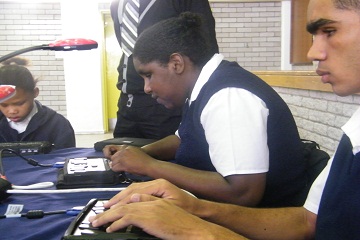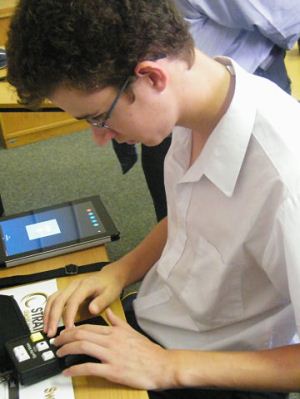Specialised education: making learning possible
 While some children are born with visual impairments, others may lose their eyesight over time.
While some children are born with visual impairments, others may lose their eyesight over time.
Visual impairment can be caused by various conditions such as diabetes, glaucoma or cataracts. Vitamin A deficiencies can also lead to blindness and severe illness in children.
According to the World Health Organisation, cataracts remain the leading cause of vision loss around the world. They also report an estimated 19 million children are visually impaired. Of these, 12 million are living with blindness due to vision problems which could have been diagnosed and corrected.
Governments around the world have established programmes to assist these learners to have equal access to education and workplace opportunities.
Living with sight loss is no barrier to education
Children who're living with vision loss learn in a different way. The Western Cape Education Department (WCED) has established several projects, to assist learners to live full lives.
The WCED's Directorate: Inclusive Education and Specialised Support Services offers a range of services for learners experiencing learning barriers. These include:
- prevention of learning difficulties,
- early identification of learning difficulties and early intervention,
- specialised support services including psychological, therapeutic, health and social services, and
- education programmes for learners with special education needs in both the mainstream schools and in special needs schools.
The department has developed a number of books and DVDs to strengthen their language skills.
In addition, the department has conducted a study to look at ways that could best support blind learners using different technologies.
The study found 3 devices that would assist learners. These include:
- eBraille portable computer,
- a device for scanning and reading printed text, and
- a portable MP3 designed for blind learners.
Recently, the Pioneer School for the Blind and the Athlone School for the Blind received a reading device known as the Eye Pal Solo. The device reads books to learners, after it’s been placed on the device’s platform.
Learners also have access to the Apex Braille Note, which enables them to access the internet, print documents and download notes for assignments.
Sigamoney Naiker, Chief Director for Inclusive Education and Special Programmes believes that these gadgets possess great value. “When confronted with reading tasks they utilise the device. Ultimately it allows blind pupils to function in any normal environment and that is the main thrust of our policy.”

This means if the learner is in a mainstream school, technical school or university, they’ll be able to read electronic text. He said the gadgets assist learners in doing their homework and working independently. “The learner therefore will be able to function optimally in any environment. This is our main emphasis, which learners could be effective and flourish in any environment.”
Early intervention and preventative services
The Department of Health and the Department of Education have introduced the Integrated School Health Policy (ISHP).
Amongst the ISHP activities, learners are screened for visual impairments. In the Western Cape, we have 4 school health and wellness mobile units.
The school health mobile unit allows for specialists services, such as the optometry and dentistry to occur on the school premises where the learner is easily accessible. In the absence of the school health mobile unit, school health services will still continue using the school premises to conduct the service.
If the learner needs spectacles, an order will be sent to the optical laboratory. If more serious visual impairments are detected, the learner may be referred to an eye clinic or ophthalmology unit.
How can you help your child?
Many visually impaired adults are educated and living independently. You can help your child become independent by contacting the specialised learner and educator support section at the education district offices and contact our healthcare facilities to determine whether your child will need spectacles or other health care services.
Or visit the Western Cape Education Department's website for more information.


